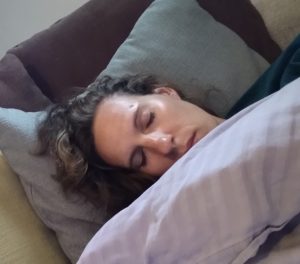There are days when you just can’t stop thinking about it. Bed time. It’s so cozy and comfy under those sheets. Wanting to catch up on the sleep you didn’t get last night. Looking forward to waking up feeling refreshed and strong. While individual sleep needs might vary greatly, there’s no one who can survive without it. Runners typically need between 7 and 9 hours per night but that can change as  training volume and intensity fluctuate.
training volume and intensity fluctuate.
Why so much sleep?
- Any training adaptation occurs during rest, making it the most important part of recovery there is. Training breaks down muscle and tissue that relaxes and is repaired by growth hormone released while snoozing.
- Failure to get enough rest can result in over training and increased risk of injury. Lack of sleep has also been shown to decrease response times and concentration. Increases in levels of stress hormone, blood pressure and insulin resistance are also potential risks.
Getting quality sleep is a must and here are some good ways to improve your bed time routine:
Staying on a schedule is one of the best ways to ensure a good night’s rest. Go to bed and climb back out at the same time each day. This will help your body settle into a regular rhythm that includes a normal sleep-wake cycle with plenty of deep, recovery sleep included.
Consider using black out curtains to keep any light out.
Put the phone down. When the sun goes down our bodies release melatonin, the sleep hormone. The blue light emitted by most technological devices wrecks that cycle and make it harder to fall asleep, stay asleep and wake up feeling refreshed. Wearing blue light blocking glasses for two hours, or leaving your devices behind for 30 to 60 minutes, before hitting the hay can aid your ability to conk out quickly.
Skipping caffeine and or alcohol for six hours before bed time is a must for high quality shut eye. Both can cause major disruption to sleep patterns for a variety of reasons and it’s best to just stay clear of either substance when you can.
What about naps? Naps can be a valuable tool for making up missed hours or getting an added pre-workout boost. Be careful, however, to avoid snoozing for more than 30 minutes. Anything longer than half an hour and you risk something called sleep inertia, a feeling of grogginess once you’ve woken up.
What if I still don’t get a good night’s rest? When you are short on sleep consider taking the day off to recover or at least lowering your training volume with fewer, easier miles than planned. You could end up doing more damage pushing through a workout tired than missing it altogether. If you’re struggling with your training and think it’s causing excess stress or preventing you from getting an adequate amount of rest, consider reaching out to a coach for help reorganizing.
Coach Meredith
